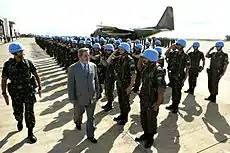| UN Security Council Resolution 1576 | ||
|---|---|---|
 Brazilian peacekeepers in Haiti (2004) | ||
| Date | 29 November 2004 | |
| Meeting no. | 5,090 | |
| Code | S/RES/1576 (Document) | |
| Subject | The situation in Haiti | |
Voting summary |
| |
| Result | Adopted | |
| Security Council composition | ||
Permanent members | ||
Non-permanent members | ||
| ||
United Nations Security Council Resolution 1576, adopted unanimously on 29 November 2004, after recalling resolutions 1529 (2004) and 1542 (2004) on the situation in Haiti, the Council extended the mandate of the United Nations Stabilisation Mission in Haiti (MINUSTAH) until 1 June 2005.[1]
The preamble of the resolution underlined the need for political reconciliation and economic reconstruction in the country.[2] It condemned acts of violence, violations of human rights and attempts by some armed groups to conduct unauthorised law enforcement in the country, which had to be disarmed as soon as possible.
Acting under Chapter VII of the United Nations Charter, the Council extended the mandate of MINUSTAH, to be renewed if necessary. The transitional government in Haiti was called upon to build an inclusive democratic and electoral process. International contributions were requested by the council, which asked the Secretary-General Kofi Annan to report every three months on the implementation of MINUSTAH's mandate.
See also
References
- ↑ "Security Council extends mandate of UN mission in Haiti until 1 June 2005". United Nations. 29 November 2004.
- ↑ "Facing worsening violence, UN mission in Haiti is renewed for 6 more months". United Nations News Centre. 29 November 2004.
External links
 Works related to United Nations Security Council Resolution 1576 at Wikisource
Works related to United Nations Security Council Resolution 1576 at Wikisource- Text of the Resolution at undocs.org